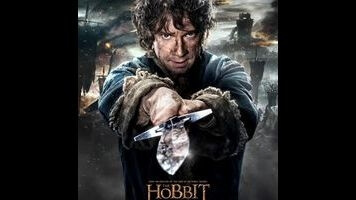Seven chapters. That’s the exact amount of book—give or take some appendices—that Peter Jackson has managed to pad, stretch, strain, bloat, expand, and exhaust in his final effort to get three long epics out of one quick read. The Hobbit: The Battle Of The Five Armies, the last gasp of this needlessly trifurcated adaptation, is the leanest of the trilogy, clocking in at a comparatively bearable 144 minutes. But this mercifully briefer running time is not a product of the filmmaker’s restraint, but simply his lack of material: Despite the addition of old franchise friends, an interspecies romance, and vengeful orc chieftains, there’s only so much movie Jackson can make out of the last 100 pages (or less) of an all-ages novel. J.R.R. Tolkien, who once implied that the only major problem with his Lord Of The Rings saga was that it was too short, has met his match in a director who sees even the author’s slimmer volumes as ripe for serialization.
There was surely, of course, some financial motive behind turning The Hobbit into a three-year holiday-season investment. But now that the unexpected journey has come to a close, and Bilbo Baggins (Martin Freeman) has gone there and back again, it’s easy to see where Jackson’s head was at: He’s after a kind of shadow remake of his own beloved, Oscar-winning Lord Of The Rings series, down to the basic progression from a fellowship’s odyssey to a lively, crosscutting middle chapter to the warring forces of a grand conclusion. Try as he might to re-spark the Middle-Earth magic, though, Jackson has produced something closer in spirit to the Star Wars prequels—an inferior second trilogy that replaces tactile wonders with flat CGI attractions, reduces a fully realized fantasy world to a series of digital screen savers, and nods constantly to the better movies that came before. On the plus side, you don’t have to see it in a ghastly 48 frames per second.
As its title indicates, much of The Battle Of The Five Armies is devoted to one of those massive showdowns Jackson has been staging, with diminishing returns, since he collided a pair of imaginary armies in the valley of Helm’s Deep. But before getting to the joystick mayhem, he has a cliffhanger to resolve and some loose ends to tie up. Opening with its grandest sequence, a fiery rampage by the dragon Smaug (Benedict Cumberbatch), the film soon returns to the reclaimed mountain headquarters of Bilbo’s dwarf companions, where Thorin (Richard Armitage) goes mad with the ecstasy of gold. As our hobbit hero withholds a glowing MacGuffin that might send the king further over the edge, both men and elves gather at the entrance to the mountain, demanding a small portion of the mighty treasure contained within. Meanwhile, a vast horde of orc troops march in their general direction, while the white wizard Gandalf (Ian McKellen, who can now play this part in his sleep) busies himself on a solo mission.
All this plot unfolds like obligation, a paragraph of book-report summary bulked up to feature length. One can feel Jackson itching to get to the eponymous carnage, but even after the 45 minutes of combat commence, The Battle Of The Five Armies fails to rise to the occasion. Where once the director seamlessly blended practical effects with digital ones, he now seems content handing the reins to the laptop department at WETA. There’s a phoniness, a hands-off unreality, to much of the action, and scenes that might wow in theory—like a battalion of soldiers building a barricade of shields, Spartan-style—fall flat in weightless execution. Only occasionally does Jackson seem to remember how to set imaginations ablaze: A skirmish with that old red eye of whathisface is a callback to the director’s genre roots, while a mano-a-monster death match on thin ice confirms that he’s better at micro conflict than macro spectacle.
Much of the enduring popularity of the Lord Of The Rings films can be attributed to their skillful balance of the intimate and the mythic; these were blockbuster adventures that never lost sight of their adventurers, be they human, halfling, or otherwise. For all the characters it introduces across a numbing eight hours of super-sized story, the Hobbit trilogy manages to marginalize the one that matters most: the hero of its title, whose gentle, faintly comic nature—perfectly conveyed by Freeman, MVP of these films—doesn’t quite gel with the over-long opus Jackson somehow built from Tolkien’s enchanting classroom staple. Bilbo fades into the sidelines of his own movie, and that may be why the mournful finale of Battle feels so canned, like a roiling tide of crocodile tears. Eleven years ago, Jackson earned the fond, seemingly endless farewells of The Return Of The King. His Hobbit series has only one ending, and it comes not a moment too soon.





















![HBO teases new Euphoria, Larry David, and much more in 2026 sizzle reel [Updated]](https://img.pastemagazine.com/wp-content/avuploads/2025/12/12100344/MixCollage-12-Dec-2025-09-56-AM-9137.jpg)



















